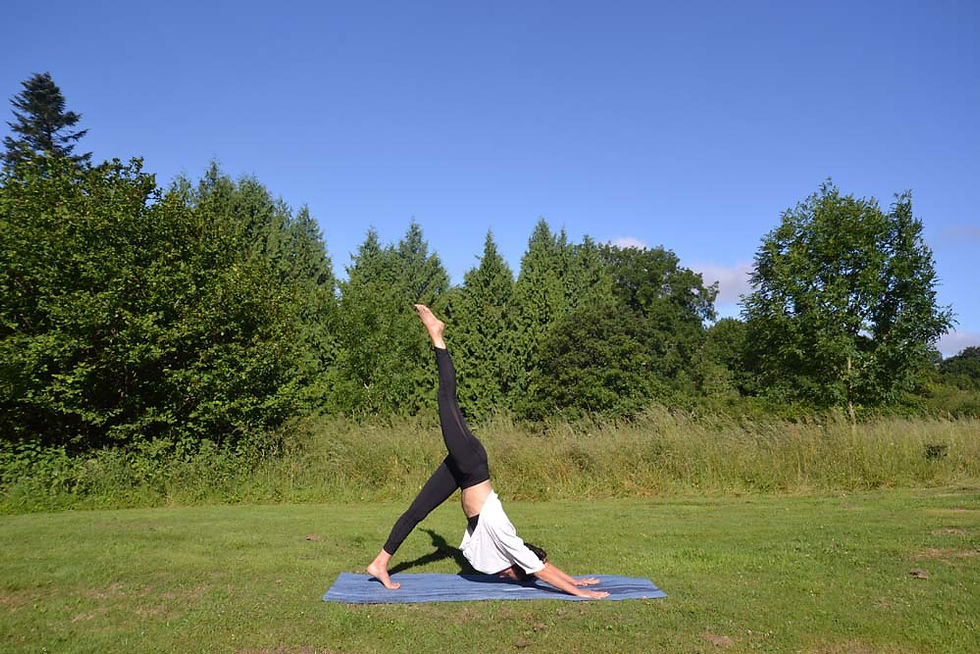A Healthy and Strong Immune System
- Reut Sapir

- Apr 29, 2020
- 3 min read

During Covid-19 epidemic, the focus is on the immune system and how we can boost it. Every so often we all need an immune boost, but a healthy and strong immune system should be maintained all year long. There are some very simple and effective habits you can practice every day to keep your immune system functioning optimally.
I believe health and wellbeing is a daily practice, and the recent reality has shown us just that. Taking care of ourselves and our families have never been more important, and I hope this will remain a priority even after the epidemic has gone.
The immune system is precisely that — a system, not a single entity. To function well, it requires balance and harmony. We are looking to balance and improve the functions of our entire body in order to achieve a stronger immune response.
A Healthy Balanced Diet
Being sufficiently nourished will significantly improve your body's response to fighting off infections. Food can act as medicine and you should include things like quality protein sources, antioxidants, nutrient dense foods, and foods that promote a healthy gut microbiome.
Protein - Helps maintain strength of all cells, including immune cells. Meats, nuts, seeds, eggs, and beans are all great sources for main meals.
Zinc - Can reduce duration and severity of illness. Good sources include nuts, meat, chickpeas, lentils, and beans.
Vitamin C - well-known for its role in strengthening your immune system and is found in citrus fruits, strawberries, leafy greens, and bell peppers.
Vitamin A - Boosts immune system, keeps skin and linings of mouth, GI tract, and lungs healthy to protect against infections. Good sources include sweet potatoes, carrots, broccoli, eggs, and bell peppers.
Vitamin B6 - is vital to supporting biochemical reactions in the immune system. Include chicken and cold water fish such as salmon and tuna as well as green vegetables and chickpeas.
Feed your Gut
The digestive tract is one of the mechanisms through which you're exposed to tremendous numbers of pathogenic organisms each day. Together with the immune system, it protects you from infection. Feeding your gut microbiome the right foods helps to maintain that proper function. Focus on meals that include plenty of fiber and greens, fermented foods, onion and garlic. You may also consider taking a probiotic supplement regularly.
Hydration
Staying hydrated will also help support healthy immune function and flush out bacteria quickly. Water helps your body produce lymph, which carries white blood cells and other immune system cells. Avoid dehydrating drinks like coffee and black tea as well as sugary drinks.
Manage stress
Stress is a fact of life, and difficult to avoid. Which makes it ever more crucial to learn how to manage our stress levels. Chronic stress can cause inflammation throughout your body, which can wear out your immune system and leave you vulnerable to illness and infections.
Meditation is a simple technique you can practice to manage your stress. You can do this with a meditation app (like Calm or Insight) or simply sitting and observing your breath. Another option is using adaptogens, medicinal herbs that help your body adapt to stress and support adrenals and immune response. Herbs such as ashwaganda, holy basil and rhodiola are all extremely beneficial.

Sleep
Sleep and the circadian system are strong regulators of immunological processes. It is when our body repairs, restores, maintains, and detoxifies itself. Sleep is also the time when immune cell memory peaks, meaning immature immune cells develop by learning how to combat bacteria and viruses while you are at rest.
If you want to improve your quality of sleep or have trouble sleeping, try a simple night routine to unwind from the day. This can include a meditation, taking a calm bath (epsom salt, lavender), turning off your screens and other stimulators.
Movement
Physical activity of any kind improves your health and wellbeing. Exercise enhances production of hormones like cortisol and endorphins that lift your mood, improve your energy and keep your blood sugar steady. Get outside for a short walk and you're bound to feel better. Find something that you love and be consistent. If you can't get outside there are plenty of online classes you can do at home. Click here for info on my online yoga classes.
Wellbeing
You will notice that all of these habits above are linked. Keeping one system well means keeping another functioning well. Our body works as a whole and we need to treat it as such, making sure all works in balance and in harmony. Focusing on improving even one area will have significant effects throughout the rest of your life. Putting your efforts and attention on key areas - eat well, move regularly, reduce stress and adequate sleep - will keep you feeling well, healthy and thriving.





Comments